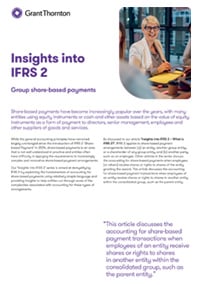-
Financial reporting and accounting advisory services
You trust your external auditor to deliver not only a high-quality, independent audit of your financial statements but to provide a range of support, including assessing material risks, evaluating internal controls and raising awareness around new and amended accounting standards.
-
Accounting Standards for Private Enterprises
Get the clear financial picture you need with the accounting standards team at Doane Grant Thornton LLP. Our experts have extensive experience with private enterprises of all sizes in all industries, an in-depth knowledge of today’s accounting standards, and are directly involved in the standard-setting process.
-
International Financial Reporting Standards
Whether you are already using IFRS or considering a transition to this global framework, Doane Grant Thornton LLP’s accounting standards team is here to help.
-
Accounting Standards for Not-for-Profit Organizations
From small, community organizations to large, national charities, you can count on Doane Grant Thornton LLP’s accounting standards team for in-depth knowledge and trusted advice.
-
Public Sector Accounting Standards
Working for a public-sector organization comes with a unique set of requirements for accounting and financial reporting. Doane Grant Thornton LLP’s accounting standards team has the practical, public-sector experience and in-depth knowledge you need.
-
Tax planning and compliance
Whether you are a private or public organization, your goal is to manage the critical aspects of tax compliance, and achieve the most effective results. At Doane Grant Thornton, we focus on delivering relevant advice, and providing an integrated planning approach to help you fulfill compliance obligations.
-
Research and development and government incentives
Are you developing innovative processes or products, undertaking experimentation or solving technological problems? If so, you may qualify to claim SR&ED tax credits. This Canadian federal government initiative is designed to encourage and support innovation in Canada. Our R&D professionals are a highly-trained, diverse team of practitioners that are engineers, scientists and specialized accountants.
-
Indirect tax
Keeping track of changes and developments in GST/HST, Quebec sales tax and other provincial sales taxes across Canada, can be a full-time job. The consequences for failing to adequately manage your organization’s sales tax obligations can be significant - from assessments, to forgone recoveries and cash flow implications, to customer or reputational risk.
-
US corporate tax
The United States has a very complex and regulated tax environment, that may undergo significant changes. Cross-border tax issues could become even more challenging for Canadian businesses looking for growth and prosperity in the biggest economy in the world.
-
Cross-border personal tax
In an increasingly flexible world, moving across the border may be more viable for Canadians and Americans; however, relocating may also have complex tax implications.
-
International tax
While there is great opportunity for businesses looking to expand globally, organizations are under increasing tax scrutiny. Regardless of your company’s size and level of international involvement—whether you’re working abroad, investing, buying and selling, borrowing or manufacturing—doing business beyond Canada’s borders comes with its fair share of tax risks.
-
Succession & estate planning
Like many private business owners today, you’ve spent your career building and running your business successfully. Now you’re faced with deciding on a successor—a successor who may or may not want your direct involvement and share your vision.
-
Tax Reporting & Advisory
The financial and tax reporting obligations of public markets and global tax authorities take significant resources and investment to manage. This requires calculating global tax provision estimates under US GAAP, IFRS, and other frameworks, and reconciling this reporting with tax compliance obligations.
-
Transfer pricing
Recognized as a leader in the transfer pricing community, our award-winning team can help you expand your business beyond borders with confidence.

-
Transactions
Our transactions group takes a client-centric, integrated approach, focused on helping you make and implement the best financial strategies. We offer meaningful, actionable and holistic advice to allow you to create value, manage risks and seize opportunities. It’s what we do best: help great organizations like yours grow and thrive.
-
Restructuring
We bring a wide range of services to both individuals and businesses – including shareholders, executives, directors, lenders, creditors and other advisors who are dealing with a corporation experiencing financial challenges.
-
Forensics
Market-driven expertise in investigation, dispute resolution and digital forensics
-
Cybersecurity
Viruses. Phishing. Malware infections. Malpractice by employees. Espionage. Data ransom and theft. Fraud. Cybercrime is now a leading risk to all businesses.
-
Consulting
Running a business is challenging and you need advice you can rely on at anytime you need it. Our team dives deep into your issues, looking holistically at your organization to understand your people, processes, and systems needs at the root of your pain points. The intersection of these three things is critical to develop the solutions you need today.
-
Creditor updates
Updates for creditors, limited partners, investors and shareholders.

-
Governance, risk and compliance
Effective, risk management—including governance and regulatory compliance—can lead to tangible, long-term business improvements. And be a source of significant competitive advantage.
-
Internal audit
Organizations thrive when they are constantly innovating, improving or creating new services and products and envisioning new markets and growth opportunities.
-
Certification – SOX
The corporate governance landscape is challenging at the best of times for public companies and their subsidiaries in Canada, the United States and around the world.
-
Third party assurance
Naturally, clients and stakeholders want reassurance that there are appropriate controls and safeguards over the data and processes being used to service their business. It’s critical.

This article discusses the accounting for share-based payment transactions when employees of an entity receive shares or rights to shares in another entity within the consolidated group, such as the parent entity.

Group share-based payments
Group share-based payment arrangements
Share-based payment arrangements are commonly agreements between an entity and its employees, where the employees receive either (1) the entity’s own equity instruments or (2) payments based on the share price of the entity’s own equity instruments. However, in some cases, share-based payment arrangements may involve another group entity or a shareholder of any group entity.
For example, a share-based payment arrangement may be entered into with the employees of one entity, but another group entity or shareholder of another group entity is responsible for settling the obligation associated with the share-based payment transaction. In other words, the entity receiving the services from the employee is not always the entity that is responsible for settling the share-based payment transaction.
To determine whether an agreement represents a group share-based payment arrangement that is within the scope of IFRS 2, it is also important to understand what a ‘group’ is and which entities or parties should be considered. IFRS 2 refers to the guidance in IFRS 10 ‘Consolidated financial statements’.
This definition is determined from the perspective of the reporting entity’s ultimate parent. For example, in the organisational structure shown below in Figure 1, the group includes the ultimate parent (UP) and all of its subsidiaries. In Figure 1, the following are two examples of share-based payment arrangements that would fall under the scope of IFRS 2:
- Example 1: UP grants a share-based payment award, to be settled in its own equity instruments, to the employees of Subsidiary C (SC).
- Example 2: Subsidiary A (SA) grants a share-based payment award to its employees, that will be settled in the equity instruments of Subsidiary X (SX).

When determining whether a transaction is within the scope of IFRS 2, it is also necessary to consider the financial statements in which the share-based payment transaction is being recorded.
In other words, is the arrangement being assessed from the perspective of the consolidated financial statements of the entire group or is the arrangement being assessed from the perspective of the separate financial statements of one entity involved in the group share-based payment transaction?
In Figure 1 above, both examples are share-based payment transactions that would be recognized in the consolidated financial statements of UP, because the consolidated entity is receiving services and settling the transaction in its own equity instruments. In addition:
- Example 1: The transaction between UP and SC is a group share-based payment that would also be recognized in the separate financial statements of both UP and SC because the settling and receiving entity are in the same group.
- Example 2: The transaction between SX and SA is a group share-based payment that would also be recognized in the separate financial statements of both SX and SA because they are entities in the same group (from the perspective of the UP).
How is a group share-based payment arrangement accounted for?
As mentioned in our article, ‘Insights into IFRS 2 – Classification of share-based payment transactions and vesting conditions’, to determine the appropriate accounting treatment, share-based payment transactions must be classified as either an equity-settled transaction or a cash-settled transaction. The classification of group share-based payment transactions requires an entity to assess:
(a) the nature of the awards granted, and
(b) its own rights and obligations.
The classification depends on whether the assessment is made from the perspective of the group entity receiving the goods or services or the group entity settling the share-based payment transaction. This is an important concept when it comes to dealing with group share-based payments as the amount recognized by the entity receiving the goods or services may differ from the amount recognized by the consolidated group or by another group entity settling the share-based payment transaction.
Receiving entity
The entity receiving the goods or services (the receiving entity) measures the goods or services received as an equity-settled share-based payment transaction when:
(a) the awards granted are its own equity instruments, or
(b) the entity has no obligation to settle the share-based payment transaction.
In all other circumstances, the receiving entity measures the goods or services received as a cash-settled share-based payment transaction. For example, if a subsidiary grants a share-based payment award to its employees that will be settled in the equity of its parent, and the subsidiary is responsible for settling the award, then the subsidiary will classify the transaction as cash-settled because (a) it is obligated to settle the award and (b) the award will not be settled in the subsidiary’s own equity but in the equity of its parent.
All of the terms and conditions of an arrangement must be considered when determining its classification. For example, a grant of shares that are redeemable either mandatorily or at the employee’s option is a cash-settled share-based payment arrangement because the entity may be obligated to ultimately settle in cash.
Another scenario is where an entity, at the time of granting an award to be settled in its own equity instruments to its employees, simultaneously issues those employees put options to sell the shares back to the entity (i.e., as a liquidity option for the employees). The existence of a cash alternative affects the classification of such arrangements (see ‘Insights into IFRS 2 – Classification of share-based payment transactions and vesting conditions’ for assessing cash alternatives).
Settling entity
The entity settling a share-based payment transaction when another entity in the group receives the goods or services (the settling entity) recognizes the transaction as an equity-settled share-based payment transaction only if it is settled in the entity’s own equity instruments. Otherwise, the transaction should be recognized as a cash-settled share-based payment transaction.
Once the group share-based payment transactions are classified as either equity-settled or cash-settled transactions, the accounting follows the methods described in our article, ‘Insights into IFRS 2 – Equity-settled share-based payment arrangements with employees' and our upcoming article, 'Insights into IFRS 2 - Cash-settled share-based payment arrangements with employees.'
How does an entity account for intragroup repayment arrangements?
Some group transactions include repayment arrangements in which one group entity is required to pay another group entity for providing share-based payments to its employees. For example, a parent company may charge a subsidiary for the equity instruments or cash that it provided to the subsidiary’s employees. In these situations, the receiving entity accounts for the share-based payment transaction in accordance with the guidance discussed above, regardless of whether an intragroup repayment arrangement exists.
In other words, the receiving entity should classify the transaction as equity-settled or cash-settled without considering the intragroup repayment arrangement. In the previous example, the existence of an intragroup repayment arrangement requiring a subsidiary to reimburse its parent for the cost of granting the awards does not mean – for the purpose of classifying the group share-based payment arrangement – that the subsidiary has the obligation to settle the award to its employees.
IFRS 2 does not address the accounting treatment for intragroup repayment arrangements. In our view, the entities should first assess whether the repayment arrangement is directly related to the share-based payment. For example, entities may consider repayment arrangements where the amount of the repayment is based on the value of the share-based payment (e.g., repayment is based on the grant-date fair value of an equity-based share-based payment) to be directly related. This assessment will depend on facts and circumstances and may vary by arrangement and jurisdiction.
When repayment arrangements are not directly related to the share-based payment, our view is that it is more appropriate for the subsidiary to recognise an expense for the repayment arrangement (note that this would result in a debit to expense in the subsidiary for both the IFRS 2 share-based payment expense and the repayment).
In contrast, our view is that repayment arrangements that are directly related to the share-based payment should be accounted for in the separate financial statements (i.e., parent and subsidiary in the above example) as an adjustment to the capital contribution recognized from the share-based payment.
When the repayment arrangement is directly related to the share-based payment and the intragroup repayment charge exceeds the capital contribution recognized in respect of the share-based payment, the entity should develop an accounting policy to account for the excess. Some approaches observed in practice are as follows:
Parent’s separate financial statements:
- the excess is credited to the income statement of the parent as dividend income, or
- the excess is credited against the investment in the subsidiary (i.e., applies even if the repayment amount exceeds the capital contribution(s) previously debited to the investment in the subsidiary for the share-based payment).
Subsidiary’s separate financial statements:
- the excess is expensed (i.e., the full amount of the repayment arrangement is expensed, in addition to the expense related to the share-based payment), or
- the excess is debited to reduce other equity.
How does an entity account for transfers of employees between group entities?
When a share-based payment arrangement has a service condition that references a group rather than a particular entity, employees may sometimes transfer between different entities in the group during the vesting period. For example, a parent may grant an award to an employee of one of its subsidiaries that is subject to remaining employed by the group for a specified period. As a result, the employee may transfer employment from one subsidiary to another without affecting the service condition.
As discussed previously, if the subsidiaries have no obligation to settle the transaction, then the arrangement is classified as an equity-settled transaction. Each subsidiary will measure the services received by the employee at the grant date fair value of the award, for the portion of the vesting period that the employee served with each subsidiary.
If the subsidiaries have an obligation to settle the transaction in the parent’s equity instruments, then the arrangement is classified as a cash-settled transaction. Each subsidiary measures the services received by the employee at the grant date fair value of the award for the portion of the vesting period that the employee was employed by that subsidiary and recognises any change in fair value of the award during the employee’s service period with each subsidiary.
If an employee that has transferred between group entities fails to meet a vesting condition other than a market condition (e.g., the employee leaves the group before completing the service condition), each subsidiary adjusts the amount previously recognized in accordance with the principles discussed in our article ‘Insights into IFRS 2 - Equity-settled share-based payment arrangements with employees’. This is because the vesting condition is service to the group.
How we can help
We hope you find the information in this article helpful in giving you some insight into IFRS 2. If you have a complex scenario or you would like to discuss any of the points raised, please speak to your usual Doane Grant Thornton contact or contact your local office.


